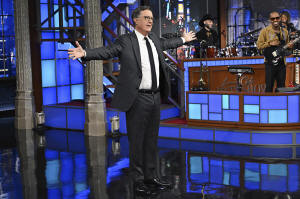Paramount gets green light for $8 billion merger. But what is the
psychic cost for company?
[July 26, 2025] By
DAVID BAUDER
With this week’s FCC approval, the merger between Paramount Global and
Skydance Media is expected to be completed in the coming weeks at a
value of $8 billion. The question for the new company is whether the
psychic cost is much higher.
It has been a particularly rough few months at Paramount-owned CBS,
where the settlement of a lawsuit regarding “60 Minutes” and announced
end of Stephen Colbert's late-night show has led critics to suggest
corporate leaders were bowing to President Donald Trump.
Following the Federal Communications Commission approval Thursday, one
of the triumvirate of current Paramount leaders, Chris McCarthy, said
that he would be leaving the company. McCarthy has been in charge of
fading cable properties like MTV, Comedy Central and Nickelodeon,
expected to bear the brunt of an estimated $2 billion in cost cuts
identified by Skydance leaders.
Skydance head David Ellison is expected to head the new company, and he
has identified former NBC Universal executive Jeff Shell as the incoming
president.
CBS News' trajectory will be scrutinized
After the merger's Aug. 7 closing date, the new leaders will be watched
most closely for how they deal with CBS News, particularly given the $16
million paid in a settlement of Trump's complaint that last fall's “60
Minutes” interview was edited to make opponent Kamala Harris look good.
Two news executives — News CEO Wendy McMahon and “60 Minutes” executive
producer Bill Owens — resigned due to their opposition to the deal.
The appointment of respected insider Tanya Simon to replace Owens this
week was seen as a positive sign by people at “60 Minutes.”
Days before the FCC's vote, Paramount agreed to hire an ombudsman at CBS
News with the mission of investigating complaints of political bias. “In
all respects, Skydance will ensure that CBS's reporting is fair,
unbiased, and fact-based,” Skydance said in a letter to FCC Chairman
Brendan Carr.

The role of an ombudsman, or public editor, who examines a news outlet's
work is often positive — if they are given independence, said Kelly
McBride, an ethics expert who has had that role at NPR for five years.
“You really want the person to have loyalty only to their own judgment
and the journalistic mission of the organization,” she said.
Having the sole mission of examining bias could be problematic, however.
To be fair, a journalist's work should be closely studied before making
that determination, not judged on the basis of one report or passage,
she said.
Carr, in an interview with CNBC on Friday, said the role “should go a
long way toward restoring America's trust in media.” Anna Gomez, an FCC
commissioner who voted to reject the deal on Thursday, interpreted the
arrangement as a way for the government to control journalists.
“They want the news media to report on them in a positive light or in
the light that they want,” Gomez told MSNBC. “So they don't want the
media to do their job, which is to hold government to account without
fear or favor.”

[to top of second column] |

This image released by CBS shows Stephen Colbert during a taping of
"The Late Show with Stephen Colbert" on Monday, July 21, 2025, in
New York. (Scott Kowalchyk/CBS via AP)
 How the merger could ripple out
across Paramount properties
According to published reports, Ellison has explored purchasing The
Free Press, a flourishing news site founded by Bari Weiss perhaps
best known for a former NPR editor's study of liberal bias in public
broadcasting. An Ellison spokeswoman did not return a message
seeking comment on Friday.
Colbert's slow-motion firing — he'll work until the end of his
contract next May — was described by CBS as a financial decision
given late-night television's collapsing economics. Colbert's
relentless lampooning of Trump, and his criticism of the “60
Minutes” settlement, led to suspicion of those motives.
“Was this really financial?” comic Jon Stewart wondered. "Or maybe
the path of least resistance for your $8 billion merger was killing
a show that you know rankled a fragile and vengeful president?”
Stewart's profane criticism on his own Paramount-owned show may
provide its own test for Skydance. “The Daily Show” is one of the
few original programs left on Comedy Central, and his contract ends
later this year.
In an odd way, Comedy Central's “South Park” buttresses CBS' claim
that the Colbert decision was financial, not political. Creators
Trey Parker and Matt Stone delivered an episode this week that
depicted a naked Trump in bed with the devil. Paramount just signed
Parker and Stone to a new $1.5 billion deal that Skydance executives
surely cleared; it makes the entire “South Park” library available
for streaming on Paramount+. a platform where Colbert's show doesn't
do nearly as well.
Figuring out what to do with others at Paramount's cable networks,
or even the networks as a whole, will be an early decision for
Ellison, son of multibillionaire and Oracle co-founder Larry
Ellison.
“There is a clear opportunity to improve Paramount's growth profile
by letting those assets go,” analyst Doug Creutz of TD Securities
told investors Friday. “On the other hand, we suspect the Ellisons
did not purchase Paramount in order to break it up for parts.”
The merger also brings together the Paramount movie studio with one
of its most regular partners. David Ellison has been one of the
industry's top investors and producers since founding Skydance in
2006.
Ellison has a challenge here, too: Years of uncertainty over its
future and modest investment in its movie pipeline has shrunk
Paramount's market share to last among the major studios. The
Paramount+ streaming service has been a money-loser.
To revive Paramount, Ellison will look to revamp its streaming
operations, leverage its franchises and try to bolster family
content.
All contents © copyright 2025 Associated Press. All rights reserved |